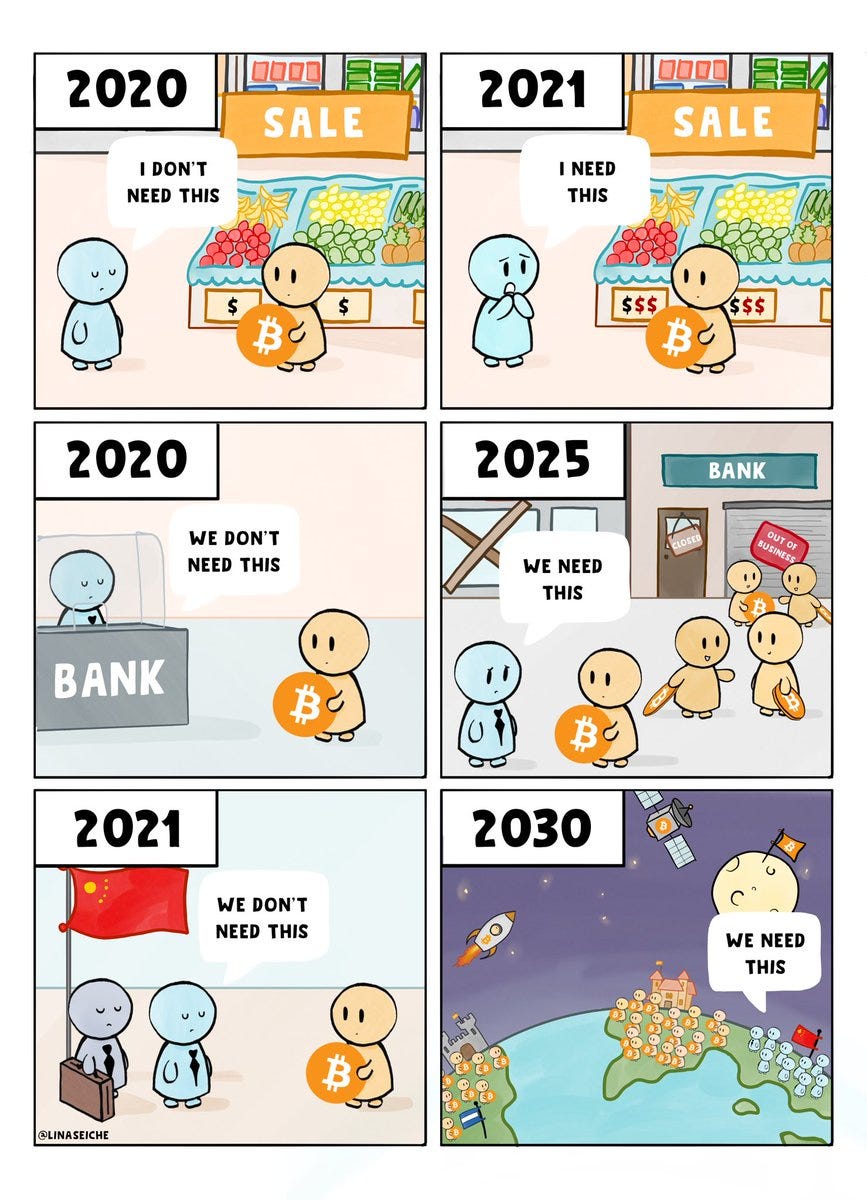If you haven’t heard, we have launched a Kickstarter for a Bitcoin policy book. The Kickstarter ends on Tuesday midnight Eastern Time, so please hurry if you would like to back us. In this edition of the newsletter, I wanted to summarize what we wrote about as a way to give you an idea of what we’re trying to do.
The book was conceived as a way to educate policymakers. As we learned over the summer, legislators and policymakers don’t know very much about the Bitcoin community and the provisions that got passed in the Infrastructure bill clearly did not take this growing constituency into account. As they found out, this is not a quiet constituency and there was quite a bit of confusion in DC over what Bitcoin users wanted.
Eight of us got together in Austin to give these policymakers a better idea of who they were dealing with. We decided after a good deal of prep work that the heart of this argument had to be about the American Dream, hence the title. We wanted to give the policymakers a good look into who we were and why so many people in the US have chosen to buy Bitcoin.
We began the book in the first chapter with answers some obvious questions, like what is Bitcoin and what the values of Bitcoin holders are. We decided to contrast the current monetary system and Bitcoin with respect to American values. We argued that Bitcoin better reflects the ideals of this nation. In the second chapter, we described the Bitcoin voter. We show how Bitcoin users are not just a bunch of anarcho-capitalist crypto-nerds, but also blue collar workers, marginalized minorities and military veterans, among other groups.
The third chapter goes into savings, particularly how unfair it is that wealthy people have an unfair advantages given their access to real estate and early stage startups. We then show that Bitcoin is much more fair and useful now for all Americans. In the fourth chapter, we show how marginalized minorities are using Bitcoin. For example, a lack of property rights historically have prevented generational wealth in the black community. We also include how many different groups have used Bitcoin’s permissionlessness to their benefit.
We compare Wall Street to Main Street in the fifth chapter and argue that Bitcoin is money for Main Street. We talk a lot about corporate welfare and how that hurts America and how Bitcoin gives small businesses a more level playing field. We continue in the sixth chapter along those lines, showing how Bitcoin will empower rural communities. Bitcoin is one of the few jobs that are moving from China to the US instead of the other way around, for example.
We discuss the national security implications in the seventh chapter and the different approaches various countries have taken. For example, we take a critical look at what China has done and why they’re proceeding on the CBDC path as an authoritarian state. We explain how the US will be much more competitive on the global landscape as a result of embracing Bitcoin.
Finally, in the eighth chapter, we give some solid policy goals for Bitcoin, including treating Bitcoin as a currency and approving Bitcoin investment vehicles. The point of the book is that whether they agree or disagree with various portions, it should give a solid basis of understanding for policymakers. As a diverse group of authors who got into Bitcoin from all walks of life, we would love to have you back us in our effort.
Bitcoin
Jeremy Rubin writes about decentralized mining pools using Payment Pools. The big idea here is that each block would reward similarly mined blocks in the past and not pay itself. The block itself would get some rewards from future blocks and so on. The idea is very interesting because the mining pool doesn’t have to be very big and still get the benefits of variance reduction from all other mining pools that participate in this “pay it backward” system. The main problems I see are bootstrapping (what happens with the very first block and where do those rewards go?) and the problem of what happens if no blocks are mined for the specific window. The variance reduction method is truly innovative and I applaud Jeremy for thinking outside the box, even if the details aren’t there yet.
A new paper comes up with a way to do distributed key generation. Previously, it wasn’t possible to generate a private key asynchronously that’s not known to any single participant. The particularly useful part of this algorithm is that it requires no coordinator or central entity that communicates with each node, but still manages to generate a private key. Given that Bitcoin is researching various threshold signature schemes, this type of research is essential in getting more interesting and useful tools out there.
Porter explains what a seed phrase is and Phil Geiger opines on how they should be secured. Both posts are from Unchained Capital and they give a lot of insight into why the phrase itself needs to be secured and not just the hardware wallet. The post is particularly enlightening in how it explains what happened with Trezors which locked down particular BIP32 paths and caused a lot of wallets to be unable to sign after a firmware upgrade.
Summer of Bitcoin 2022 is taking applications! This is an excellent program for those that want to get into Core development. This year, they also have a design track, which should add better UX, hopefully, throughout the Bitcoin ecosystem.
Lightning
Andreas, Laolu and Rene have published their book Mastering the Lightning Network. This book, much like Andreas’s previous book is also available on Github for free. This is a monumental achievement and the three of them deserve a ton of credit. I really hope they update this book as Schnorr, Taproot and ANYPREVOUT change stuff at the protocol level.
t-bast explains how Taproot changes a bunch of things in Lightning. The most obvious change is that MuSig lets you fund Lightning channels without any on-chain multisig, making the transaction indistinguishable from a normal p2tr spend. Slightly less obvious is the fact that a lot of scripts in Lightning now can be expressed much easier as Tap Scripts in a 2-element Tap Tree. Finally, Taproot lays down the framework by which PTLCs (Point-timelocked contracts) can replace HTLCs (hash-timelocked contracts). Worth reading to see what we can expect to see in the next few years.
LN Markets covers turbo channels in their always informative newsletter. Turbo channels are currently used by many Lightning wallet providers and are essentially payment channels funded by a 0-confirmation transaction. The post goes into the tradeoffs and why wallet providers do this. The post definitely shows why the UX for a lot of lightning wallets is so smooth.
Kollider argues that Lightning is perfect for Algorithmic Traders. The main benefit for traders is the speed at which funds can be moved around, particularly to margin positions at exchanges. Lightning allows traders to not have to keep as large a buffer on each exchange, but use the network to transfer the coins as necessary. There’s a bit of irony here since liquidity was the inspiration behind one of Lightning’s competitors.
Economics, Engineering, Etc.
John Vallis reflects on Bitcoin, God and Consciousness. The post is long and largely philosophical, but sheds significant light on why Bitcoin has a tendency to cause inquiries in other parts of life. As John points out, money, being a fundamental part of communities, has significant relation to God and consciousness. The post goes to Jordan Peterson’s Maps of Meaning, rationality and meaning. The post is a good example of how deep the rabbit hole in Bitcoin really goes.
Nicolas Weaver completely destroys the Web 3.0 narrative around Ethereum. As he explains, there are several things you currently need for participating on the distributed web, including a domain and a server. Web 3.0 doesn’t obviate this need, but rather adds a significant layer of complexity, for no obvious benefit. The point being that the Web 3.0 infrastructure is just Web 2.0 with tokens, which benefit the token creators and not any of the users. In other words, it’s a scam.
Jeff Van Drew explains how to invest in Bitcoin in your IRA. This post gets into the weeds of US tax law and goes into detail about the strategy Unchained uses to put Bitcoins into an IRA. If you are using the IRA vehicle for Bitcoin investing, this is worth taking a look to understand the implications of the recent McNulty case.
Banning mining has moved a lot of miners elsewhere, but not everyone. It seems that there’s still a significant number of miners that chose to stay in China despite the ban. They are obviously operating illegally, but perhaps this is the best they can do since moving the equipment abroad is bound to be expensive and the sale of equipment is likely to be puny compared to the gains they can make mining.
Keep it Simple Bitcoin has an excellent primer on Bisq. I confess I haven’t used Bisq before, but the idea is great for those that are wondering how they can exchange BTC for fiat money without an exchange that will inevitably require some KYC/AML restrictions.
Ledn has a Bitcoin-backed mortgage product. This will be really nice for Bitcoin holders that want homes, but don’t want to sell their Bitcoins. Essentially, Bitcoin can be leveraged for real estate, which is an interesting play, though, as with any sort of leverage, there’s some risk of loss.
Quick Hits
You can now travel the world using Lightning.
Progressive Bitcoiners should look at this.
Myanmar anti-junta groups are using Tether instead of USD.
Some stake/steak humor.
Another week, another bug in a Turing vulnerable smart contract. This one’s for $32 billion.
Events
I am planning to be in London for Advancing Bitcoin March 3-4, but there is some possibility I won’t be able to get into the UK. I am also going to be at Bitcoin 2022 in Miami April 6-8.
I’ll also be doing the Programming Blockchain seminars in London March 1-2 (subject to being able to get into the UK) and Miami April 4-5.
Podcasts, Etc.
On this week’s Bitcoin Fixes This, I talked to Jason Lowery about the Space Force and his theory that proof-of-work is a substitute for military expenditure. I haven’t done a podcast this long before, so please provide feedback if you want to see more longer-form podcasts like this.
I read through last week’s newsletter which you can find here. I continued talking to Robert Breedlove on the What is Money show about Democracy, fiat money and war.
I was on Winging It to talk about Thank God for Bitcoin:
Unchained Capital is a sponsor of this newsletter. I am an advisor and proud to be a part of a company that’s enhancing security for Bitcoin holders. If you need multisig, collaborative custody or bitcoin native financial services, learn more here.
Fiat delenda est.













Bisq is an excellent initiative that should be supported to allow people to buy Bitcoin without having to comply with the KYC/AML policies of centralized exchange platforms. Important to highlight them in this issue.